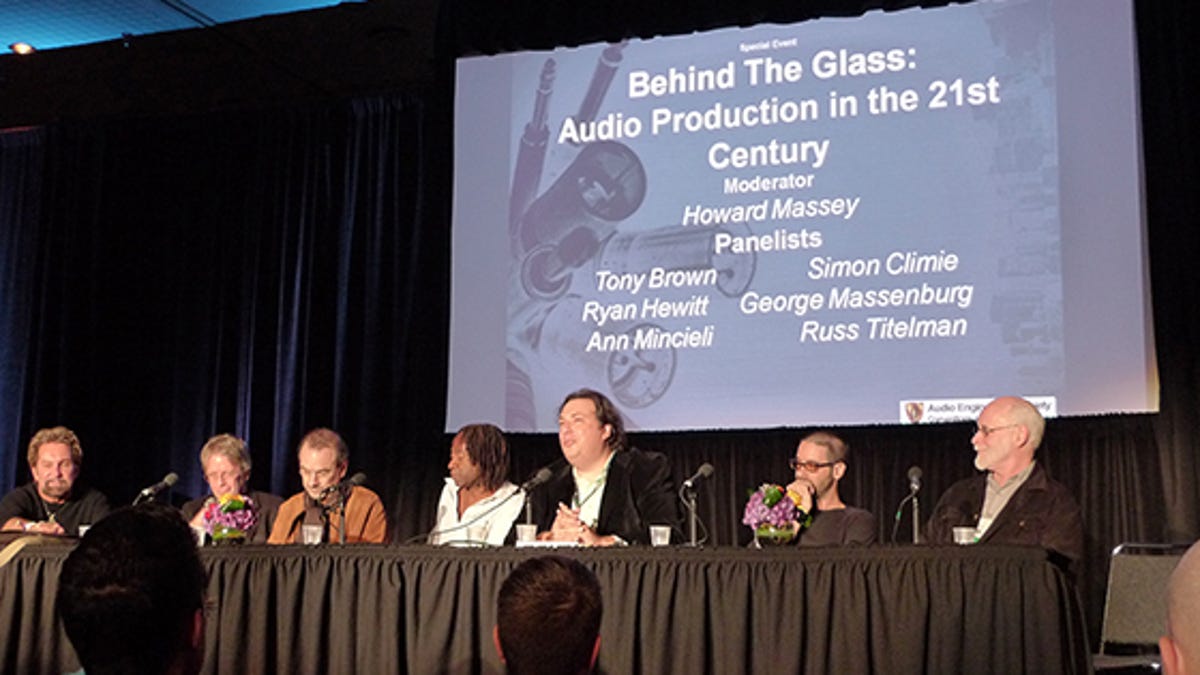 Why You Can Trust CNET
Why You Can Trust CNET Top recording engineers explain why music sounds awful
I attended a fascinating panel discussion, "Behind The Glass: Audio Production in the 21st Century" at the Audio Engineering Society convention in New York City on Sunday.

I attended a fascinating panel discussion, "Behind The Glass: Audio Production in the 21st Century" at the Audio Engineering Society convention in New York City on Sunday.
The panelists were all prominent record producers and engineers: Tony Brown (Elvis Presley, Emmy Lou Harris); Jimmy Douglass (Jay-Z, the Rolling Stones); Dave Hewitt (Simon and Garfunkel, U2); Ryan Hewitt (Avett Brothers, Red Hot Chili Peppers); George Massenburg (Linda Ronstadt, Lyle Lovett); Ann Mincieli (Alicia Keys, Whitney Houston); and Russ Titelman (Stevie Winwood, Eric Clapton). These people know from where they speak!
Moderator Howard Massey led the panel through a discussion of the problems facing the record industry, with a primary focus on sound quality. Massey co-authored (with Geoff Emerick) my favorite Beatles book of all time, "Here, There and Everywhere: My Life Recording the Music of the Beatles." He also has a new book coming out, "Behind the Glass, Volume II: Top Producers Tell How They Craft the Hits" a collection of interviews with top record producers and audio engineers.
It seems like the main problem comes from record company pressure to make perfect recordings. Vocalists' off-pitch and out-of-time singing is tweaked with Auto-Tune; music-making is largely technology-based. That is, technology has replaced musical talent, and singers like Britney Spears were cited many times as to where it's all headed. Not so musically talented, her music has to be patched together in the studio. There's not a lot of there there.
Jimmy Douglass talked about the overuse of dynamic range compression, admitting that since most music is listened to over crappy computer speakers or cheap earbuds, compression is required to make it sound acceptable. Sad, but true.
For better musicians, technology can inhibit spontaneity. For George Massenburg, "It's all about authenticity," his goal in the studio is to simply capture a moment. And when recording engineers do that, the emotional power of the music has some chance of connecting with the listener.
There was a lot of talk about the analog vs. digital divide, but in the end the panelists just want to make records that move people and "break some hearts." They all agreed that great songs conquered all. But much of the time production has to be used to bolster weak material.
Looking ahead 10 years, engineer/producer Ryan Hewitt hoped he'd get to record bands that can sing and play, without studio trickery. And if they don't get the tune as they want it, just do another take. Hewitt wants musicians to make music, but too much of the time it's the engineers who have to create it out of bits and pieces of crap.

